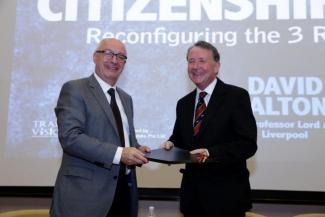
- SMU Launched Annual Wee Kim Wee Distinguished Lecture Series on Educational Leadership
- Professor Lord David Alton of Liverpool Delivered Inaugural Lecture
- Training Vision Institute Supports First Five Years of the Series
This year, the SMU Wee Kim Wee Centre (WKWC) is proud to launch the brand-new “Annual Wee Kim Wee Distinguished Lecture Series on Educational Leadership”, as a tribute to capture the indomitable spirit of the late President, Dr Wee Kim Wee.
In this series of lectures, key educators are invited to provide various scholarly perspectives on strategic issues concerning higher education and educational leadership. It aims to inspire and bring about sustainable and positive change while enabling attendees to develop a fuller understanding of the importance of effective leadership in the field of education.
For the first five years, the annual lecture series is generously supported by the Training Vision Institute (TVI). At the inaugural lecture, TVI presented a cheque worth S$50,000 to SMU.

[Photo: Mr David Kwee, CEO of Training Vision Institute (left) presented a cheque to Professor Arnoud De Meyer, President of SMU as generous support for the first five lectures of the “Annual Wee Kim Wee Distinguished Lecture Series on Educational Leadership”.]
SMU is proud to have had Professor Lord David Alton, a highly sought-after global speaker, deliver the first lecture for the annual series. A respected British politician of 18 years, educationalist and advocate on a number of international humanity issues, he was specially flown in to speak at the inaugural session on 30 March evening.
Held at the SMU Mochtar Riady Auditorium, SMU President Professor Arnoud De Meyer opened the lecture with a welcome address to an enthusiastic audience of some 300 guests.

[Photo: Professor Lord David Alton at the inaugural lecture on the topic of “Education for Citizenship: Reconfiguring the 3 Rs”.]
Focusing on the topic of “Education for Citizenship”, Lord Alton addressed why citizenship is crucial, what it entails and how an education through schools should build citizenship.
In addressing the exercising of rights and responsibilities within communities at local, national and global levels, he touched on the development of informed decision-making, and the ability to take thoughtful and responsible action. He advocated that young people should complete and leave education with an understanding of the political, legal and economic functions of adult society; and with the social and moral awareness to thrive in it.
He also covered other aspects such as developing an understanding of fairness and justice, skills of critical evaluation, and expressing attitudes and beliefs, to respond to the challenges faced as global citizens in a constructive and positive manner. The issues addressed included human rights, sustainable development, peace and conflict resolution, social equality and appreciation of diversity.
Citizenship education is crucial because it builds character, explores values and develops the soft skills of communication, initiative, interacting appropriately and team working that that employers are crying out for. Essentially, education in the present needs to address “Respect, Rights, and Responsibilities”, and no longer can focus on just the mantra of “Reading, wRiting and aRithmetic” like the past.
Sprinkling the talk with anecdotes including examples from Singapore and the eastern part of the world, Lord Alton’s lecture inspired many, evident from a continuous stream of questions and thoughts shared by the international audience from the floor.

[Photo: At the panel session, more discussion took place on topics such as respect, rights, responsibilities, and related citizenship areas such as diversity, life lessons and leadership.]
Before the question-and-answer session, the audience also heard more from a discussion by a panel, including Professor De Meyer, as well as SMU Dean of School of Social Sciences Professor James Tang, who joined Lord Alton, moderated by WKWC Director Associate Professor Kirpal Singh.

[Photo: (Second from left) Professor Lord David Alton was presented a token of appreciation, an art piece by an SMU alumnus. With him are (from left) SMU President Professor De Meyer, SMU Dean of School of Social Sciences Professor James Tang, and WKWC Director Associate Professor Kirpal Singh.]
With an extensive career in politics, education and human rights issues lobbying, Lord Alton’s breadth and depth of experience allowed him to share unique insights on the topic.
He has been Professor of Citizenship and Director of the Roscoe Foundation for Citizenship, at Liverpool John Moore’s University since 1997, promoting the development of ethical students and active citizenship in the wider community.
He has done extensive work on human rights, such as founding the Jubilee Campaign, a British charity working with street children, receiving international awards on human rights, authoring several reports on human rights in countries such as Rwanda, and writing books such as “Building Bridges – Is there hope for North Korea?”.
Since leaving party politics in 1997, he has been an Independent Member of the House of Lords and an appointed Independent Life Peer, speaking regularly on human rights and religious liberty issues. He has taken particular interests in issues such as poverty, gendercide, human cloning, and human trafficking. In 1979, he became Britain’s youngest member of the House of Commons. He has served in British public life since his election in 1972.
[Featured Photo: Professor Arnoud De Meyer, SMU President, expressed his appreciation to Professor Lord David Alton, for delivering the inaugural lecture.]